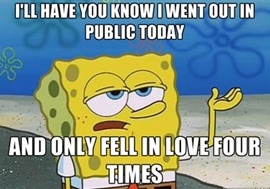Professor & Chair of the Department of Psychology at Monmouth University, Gary Lewandowski Jr, has been studying this very subject with surprising results:
Millions of people take to the bars, coffee shops and internet sites of the world looking for love. Finding that love connection isn’t always easy because your new found guy may end up having too many Star Trek figurines or your new found gal may have one too many cats. While there are seemingly a million things that can go wrong, people do fall in love.
But is it possible that some people fall easier than others?
How They Did It
To answer this question, researchers from UCLA surveyed over 350 men and women (average age ~30) about their experiences with falling in love. Researchers defined love for the participants as “A very powerful emotional experience that might include excitement and anxiety, tender feelings and physical attraction toward a particular person, constant thoughts of the person, and an intense desire to be around the person.” Participants then answered a question about whether they typically fell in love quicker than their partner, participants also listed the number of people with whom they have been in love, how many times they experienced “love at first sight”, and how many of their “loves” led to a relationship. Researchers also asked about the importance of physical attractiveness and how many times the participants mistakenly overestimated another person’s interest in having sex with them.
What They Found
Results of the study indicate that men and women reported a similar number of lifetime “loves” and similar occurrences of falling in love first. However, compared to women, men reported physical attractiveness was more important and were more likely to mistakenly overestimate sexual interest from another person. Men also reported more occurrences of “love at first sight” and were more likely to fall in love without a partner reciprocating that feeling. Men who were more likely to overestimate females’ sexual interest fell in love more frequently, while women did not show a similar pattern. Men who place more importance on physical attractiveness fell in love first in their relationship more often when they thought they were with a highly attractive partner. Finally, women with a higher reported sex drive also reported falling in love more frequently.
What Does This Mean? 
Overall, men seem to fall in love easier than women, but why? It may be that men fall in love easier because they think being in love is important to women. Thus, men fall in love is a way to show female partners that they are committed to the relationship. The fact that men were more likely to fall in love when they over estimated sexual interest suggests that a man may be more likely to have interest in a women once he believes she has sexual interest in him. That is, the way to a man’s heart is through his…well you know. Of course it is also possible that men who fall in love more easily are also inclined to overestimate sexual interest as a way of validating his own feelings.
Though there may be true differences between men and women, it is also possible that this study tells us more about who falls in “lust” more easily. The researchers definition of love focuses heavily on the more passionate aspects of love such as powerful emotions, attraction, excitement, and intense desire. It is possible that a study focusing on more companionate or friendship-based love could yield a different pattern of results.
After reading about this study, it may seem obvious to you that men fall in love easier than women. But if I had asked you earlier, “who falls in love more easily, men or women?” would you have answered “men”? Maybe you would have, but what about others you know. Give it a try and then set the record straight with a little science.
If you would like to learn more about what science has to say about relationships,
check www.scienceofrelationships.com where you can join millions of others who read hundreds of short engaging articles about nearly every relationship question you may have.
Reference citation: Galperin, A. & Haselton, M. (2010). Predictors of how often and when people fall in love. Evolutionary Psychology, 8, 5-28
What are your thoughts on the matter? Tell us @Lovestruck
![Science of Relationships Logo[1]](http://www.lovestruck.com/blog/wp-content/uploads/2014/06/Science-of-Relationships-Logo1.jpg)



